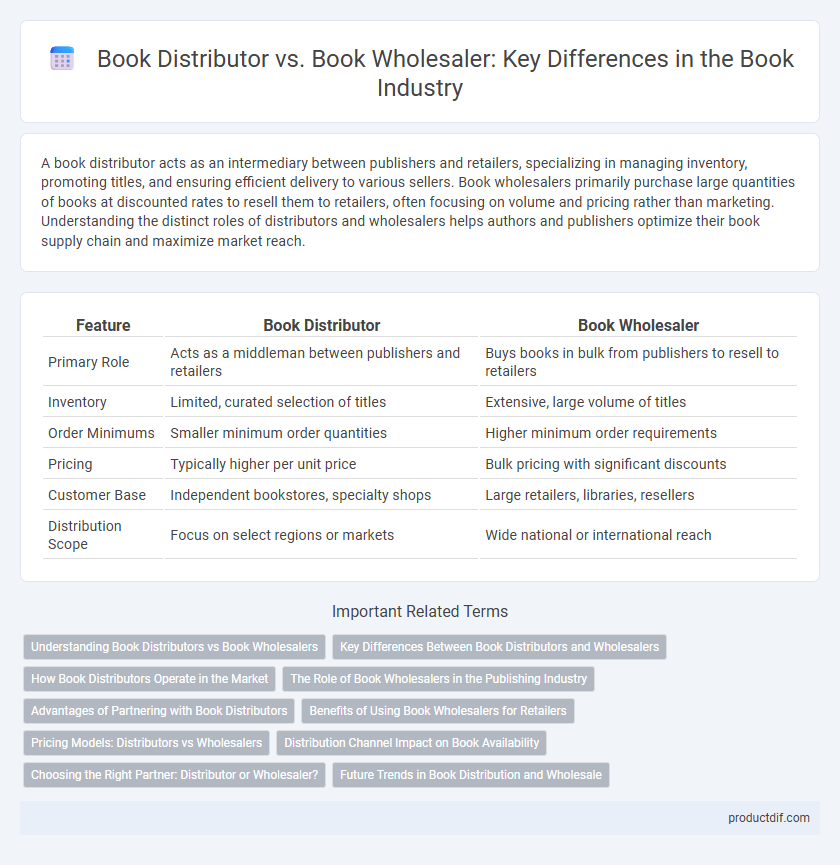A book distributor acts as an intermediary between publishers and retailers, specializing in managing inventory, promoting titles, and ensuring efficient delivery to various sellers. Book wholesalers primarily purchase large quantities of books at discounted rates to resell them to retailers, often focusing on volume and pricing rather than marketing. Understanding the distinct roles of distributors and wholesalers helps authors and publishers optimize their book supply chain and maximize market reach.
Table of Comparison
| Feature | Book Distributor | Book Wholesaler |
|---|---|---|
| Primary Role | Acts as a middleman between publishers and retailers | Buys books in bulk from publishers to resell to retailers |
| Inventory | Limited, curated selection of titles | Extensive, large volume of titles |
| Order Minimums | Smaller minimum order quantities | Higher minimum order requirements |
| Pricing | Typically higher per unit price | Bulk pricing with significant discounts |
| Customer Base | Independent bookstores, specialty shops | Large retailers, libraries, resellers |
| Distribution Scope | Focus on select regions or markets | Wide national or international reach |
Understanding Book Distributors vs Book Wholesalers
Book distributors manage the logistics of delivering books from publishers to retailers, often providing marketing support and inventory management, whereas book wholesalers operate as bulk suppliers offering large quantities at discounted prices primarily to bookstores and libraries. Distributors typically have exclusive agreements with publishers and offer a curated selection, while wholesalers maintain extensive inventories of various publishers' titles for quick fulfillment. Understanding these roles helps publishers optimize supply chains and retailers choose the most efficient channels for stocking diverse book inventories.
Key Differences Between Book Distributors and Wholesalers
Book distributors primarily focus on marketing, selling, and delivering books directly to retailers and consumers, often offering extensive promotional support and tailored services. Book wholesalers, on the other hand, operate on a larger scale by purchasing books in bulk from publishers and supplying them at discounted rates to various retailers, emphasizing volume sales over individualized service. Key differences include their target customers, scale of operation, and the level of service provided, with distributors offering specialized marketing while wholesalers prioritize inventory turnover.
How Book Distributors Operate in the Market
Book distributors operate by purchasing large quantities of titles directly from publishers, then supplying bookstores, libraries, and online retailers with diverse selections. Their role involves managing inventory, marketing, and handling logistics to efficiently meet market demand. Unlike wholesalers, distributors often provide additional services like promotional support and tailored order fulfillment to maximize sales potential.
The Role of Book Wholesalers in the Publishing Industry
Book wholesalers play a crucial role in the publishing industry by purchasing large quantities of books from publishers and distributing them to retailers, libraries, and educational institutions. They provide a vital link between publishers and the marketplace, helping to manage inventory, reduce distribution costs, and increase the accessibility of books to a wider audience. Their ability to aggregate diverse titles supports smaller bookstores and enhances the overall efficiency of book distribution networks.
Advantages of Partnering with Book Distributors
Book distributors offer extensive market reach by connecting publishers with a wide network of retailers, libraries, and online platforms, ensuring higher sales volume and diverse audience access. They provide tailored marketing support and inventory management services that reduce logistical burdens for publishers and streamline the supply chain. Partnering with book distributors enhances visibility and timely availability of titles, maximizing revenue potential and brand presence across multiple sales channels.
Benefits of Using Book Wholesalers for Retailers
Book wholesalers offer retailers significant advantages by providing access to a wide range of titles at competitive bulk prices, enabling higher profit margins and diverse inventory. Their streamlined ordering processes and established relationships with publishers ensure faster delivery and reliable supply chains. Retailers benefit from flexible purchasing options and reduced storage costs, enhancing overall operational efficiency.
Pricing Models: Distributors vs Wholesalers
Book distributors typically operate on a discount-based pricing model, offering retailers a percentage off the retail price, often ranging from 40% to 55%, which includes services like marketing and inventory management. Book wholesalers, by contrast, usually sell books in bulk at lower margins with fixed prices, focusing on volume sales to smaller retailers or libraries without additional promotional support. Distributors tend to have more flexible pricing tailored to market demand, while wholesalers prioritize efficiency and lower costs through standardized pricing structures.
Distribution Channel Impact on Book Availability
Book distributors play a key role in expanding the distribution channel by directly connecting publishers with a diverse network of retailers, increasing book availability across multiple sales points. Book wholesalers primarily serve as bulk intermediaries, handling large quantities of titles to supply retailers efficiently but with less emphasis on market segmentation or targeted distribution. Efficient distribution channels facilitated by distributors enhance market reach and availability, while wholesalers optimize inventory flow and cost management within the supply chain.
Choosing the Right Partner: Distributor or Wholesaler?
Choosing the right partner between a book distributor and a book wholesaler depends on your business needs and scale. Distributors often offer broader marketing support and direct relationships with retailers, making them ideal for publishers seeking extensive market reach and promotional services. Wholesalers provide bulk purchasing options with lower upfront costs, suitable for retailers or small businesses focusing on volume rather than marketing assistance.
Future Trends in Book Distribution and Wholesale
Emerging technologies such as AI-driven inventory management and blockchain for transparent supply chains are poised to transform book distribution and wholesale markets. Direct-to-consumer platforms and digital print-on-demand services are reducing reliance on traditional distributors and wholesalers while increasing efficiency. Sustainable practices and eco-friendly packaging are becoming industry standards, influencing future strategies in book distribution and wholesale operations.
Book Distributor vs Book Wholesaler Infographic

 productdif.com
productdif.com